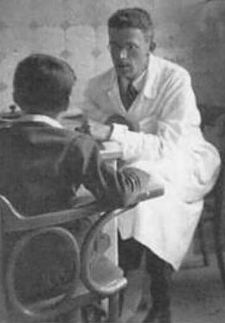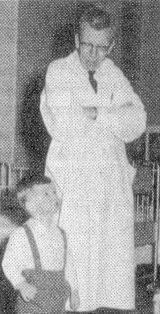History of Asperger Syndrome
Like Autism, Asperger Syndrome was almost certainly around a very long time before any publications were made describing it or before it was given any official title or name.
In 1926, Eva Sucharewa, a Russian neurological scientific assistant, wrote a paper referring to the "Schizoid Personality of Childhood", giving was an account of 6 boys and their behavioural habits and very strongly resembled the findings from Hans Asperger.
Hans Asperger was a Viennese child psychologist who published the first definition of Asperger syndrome in 1944. In four boys, he identified a pattern of behavior and abilities that he called "autistic psychopathy", meaning autism (self) and psychopathy (personality disease). The pattern included "a lack of empathy, little ability to form friendships, one-sided conversation, intense absorption in a special interest, and clumsy movements."
Asperger called children with AS "little professors" because of their ability to talk about their favorite subject in great detail. It is commonly said that the paper was based on only four boys. However, Dr. Günter Krämer, of Zürich, who knew Asperger, states that it "was based on investigations of more than 400 children". Asperger was convinced that many of the children he identified as having autistic symptoms would use their special talents in adulthood.
He followed one child, Fritz V., into adulthood. Fritz V. became a professor of astronomy and solved an error in Newton’s work he originally noticed as a child.
Hans Asperger’s positive outlook contrasts strikingly with Leo Kanner's description of autism, of which Asperger's is often considered to be a high-functioning form.
Near the end of World War II, Asperger opened a school for children with autistic psychopathy, with Sister Victorine. The school was bombed towards the end of the war, Sister Victorine was killed, the school was destroyed and much of Hans Asperger's early work was lost. It was this event that arguably delayed the understanding of autism spectrum conditions in the west.
Interestingly, as a child, Hans Asperger appears to have exhibited features of the very condition named after him. He was described as a remote and lonely child, who had difficulty making friends. He was talented in language; in particular he was interested in the Austrian poet Franz Grillparzer, whose poetry he would frequently quote to his uninterested classmates. He also liked to quote himself and often referred to himself from a third-person perspective.
Hans Asperger died before his identification of this pattern of behavior became widely recognized, because his work was mostly in German and barely translated.
The term "Asperger's syndrome" was popularized in a 1981 paper by British researcher Lorna Wing MD, FRCPsych and one of the founders of the National Autistic Society (NAS), as a result of having a Autistic Daughter became involved in researching developmental disorders and her findings challenged the previously accepted model of autism presented by Leo Kanner in 1943.
Unlike Kanner, Hans Asperger's findings were ignored and disregarded in the English-speaking world in his lifetime. Finally, from the early 1990s, his findings began to gain notice, and nowadays Asperger's Syndrome is recognized as a condition in a large part of the world. Hans Asperger died in Vienna on Tuesday 21st October 1980, at the age of 74, not living to see his work either acknowledged or recognised in the English speaking world. He was born on Sunday 18th February 1906.


Pages
- What is Aspergers
- Myths about Autism
- History of Aspergers
- Signs of Aspergers
- Key Characteristics
- Cause of Aspergers
- Asperger Research
- Is there a Cure and what does the Future Hold
- Famous People With Aspergers
- Agony Aunt Q&A
- Teaching Strategies
- Books on Aspergers
- Useful Links
- Related Conditions
- Printables
- Asperger Test
- Page References
Sponsored Links


We would welcome any feedback or suggestion on how to improve my site or add any information we may have missed so please feel free to mail me we are also looking for ways to increase the amount of people we can help so if you run a website and you would be willing to either add a link to my site or even add a small banner on your site to help please mail me via the contact me option at the top of this page